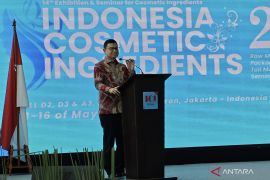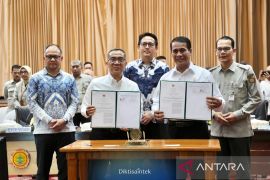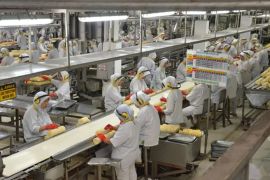"The food and beverage industry has become the backbone of the non-oil and gas processing industry, with a significant contribution to national GDP and job creation," Industry Minister Agus Gumiwang Kartasasmita stated here on Monday.
Based on the ministry's data, in the third quarter of 2024, the food and beverage industry showed notable growth of 5.82 percent, higher than the national GDP growth of 4.95 percent.
Its contribution to the GDP of the non-oil and gas processing industry was also quite significant at 40.17 percent, indicating its vital role in the national economic structure.
According to Kartasasmita, the positive performance of the food and beverage industry was driven by increased domestic demand and exports, as well as the continued flow of investment into the sector.
"The realization of investment in the food and beverage industry in the third quarter of 2024 reached Rp30.23 trillion, an increase of 28 percent compared to the same period the previous year," he informed.
The industry also absorbed around 3.6 million workers through 1.7 million small and medium enterprises (SMEs).
Meanwhile, the agro-industrial sector as a whole, which includes the food and beverage industry, employed up to 9.37 million workers in 2024.
Therefore, to boost the competitiveness of the food and beverage industry amid global competition, the Ministry of Industry is actively helping national entrepreneurs establish cooperation with international partners.
According to director general of agro industry at the ministry, Putu Juli Ardika, the strengthening of cooperation with international partners is aimed at supporting the transfer of technology and knowledge, besides export market expansion.
"International partnerships are key to driving innovation, improving product quality, and expanding the export reach of our food and beverage industry. We will continue to facilitate and support this collaboration," he said.
He cited the recent cooperation between PT Niramas Pandaan Sejahtera (NPS), which makes Indonesian food and beverage products bearing the INACO trademark, and Tarami Corporation, the leading fruit jelly producer in Japan.
Under the collaboration, NPS is making fruit jelly cups while matching Japanese production standards with the help of the Japan Quality Line, a special production line that guarantees the safety, quality, and taste of products, putting them on par with goods made in Nagasaki, Japan.
This project is also supported by Kawasho Foods Corporation, which is helping procure some of the raw materials.
The entire production process, right from sourcing raw materials to the final product, is halal compliant and meets internationally recognized halal certification standards.
Along with Kawasho Food Corporation and Tarami Corporation, NPS has reaffirmed the company's commitment to management policies that aim to create new and relevant value amid global market changes.
Their collaboration marks an important milestone for PT Niramas Utama, the parent company of NPS, in its push to enter the global market.
NPS president director Adhi Lukman said that the collaboration is the result of challenging negotiations that lasted nearly two years.
"With the existing facilities and good work ethic, we believe this collaboration will run well and sustainably. We are committed to continuing to present healthy, safe, and high-quality products for Muslim consumers around the world," he added.
By combining innovation, halal values, and Japanese quality, the collaboration between the three companies is expected to set an example in cross-country synergy that produces real benefits for the global community, especially increasingly discerning Muslim consumers.
Minister Kartasasmita praised the collaboration, which is expected to improve the global image of Indonesian products, especially in the halal food segment.
"We hope more national industries will be able to become a part of the global halal supply chain," he said.
"Furthermore, considering that Indonesia is the country with the largest Muslim population, we must become the largest halal producer, as an effort to achieve the 8-percent growth target," he added.
Related news: Indonesian F&B industry secures US$43.7 million at Singapore FHA Expo
Related news: Indonesia's halal industry hinges on three sectors: Industry Ministry
Translator: Ahmad Muzdaffar Fauzan, Yashinta Difa
Editor: Primayanti
Copyright © ANTARA 2025












